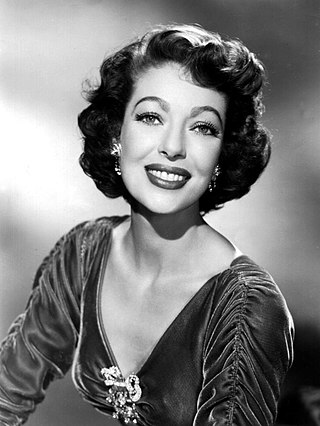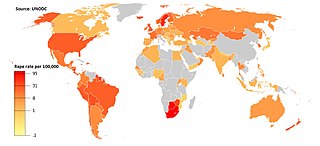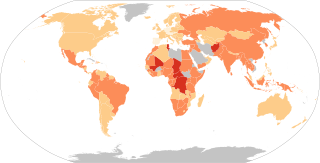
Loretta Young was an American actress. Starting as a child, she had a long and varied career in film from 1917 to 1953. She received numerous honors including an Academy Award, two Golden Globe Awards, and three Primetime Emmy Awards as well as two stars on the Hollywood Walk of Fame for her work in film and television.
Acquaintance rape is rape that is perpetrated by a person who knows the victim. Examples of acquaintances include someone the victim is dating, a classmate, co-worker, employer, family member, spouse, counselor, therapist, religious official, or medical doctor. Acquaintance rape includes a subcategory of incidents labeled date rape that involves people who are in romantic or sexual relationships with each other. When a rape is perpetrated by a college student on another student, the term campus rape is sometimes used.
Some victims of rape or other sexual violence incidents are male. It is estimated that approximately one in six men experienced sexual abuse during childhood. Historically, rape was thought to be, and defined as, a crime committed solely against females. This belief is still held in some parts of the world, but rape of males is now commonly criminalized and has been subject to more discussion than in the past.

Rape culture is a setting, studied by several sociological theories, in which rape is pervasive and normalized due to societal attitudes about gender and sexuality. Behaviors commonly associated with rape culture include victim blaming, slut-shaming, sexual objectification, trivializing rape, denial of widespread rape, refusing to acknowledge the harm caused by sexual violence, or some combination of these. It has been used to describe and explain behavior within social groups, including prison rape and in conflict areas where war rape is used as psychological warfare. Entire societies have been alleged to be rape cultures.
Loretta Tofani is a Pulitzer Prize-winning American journalist.
Rape can be categorized in different ways: for example, by reference to the situation in which it occurs, by the identity or characteristics of the victim, and by the identity or characteristics of the perpetrator. These categories are referred to as types of rape. The types described below are not mutually exclusive: a given rape can fit into multiple categories, by for example being both a prison rape and a gang rape, or both a custodial rape and the rape of a child.
Rape by gender classifies types of rape by the sex and/or gender of both the rapist and the victim. This scope includes both rape and sexual assault more generally. Most research indicates that rape affects women disproportionately, with the majority of people convicted being men; however, since the broadening of the definition of rape in 2012 by the FBI, more attention is being given to male rape, including females raping males.

The Lorton Reformatory, also known as the Lorton Correctional Complex, is a former prison complex in Lorton, Virginia, established in 1910 for the District of Columbia, United States.

The Third Twin is a 1996 techno-thriller book by Ken Follett. A New York Times bestseller, the book deals with genetic engineering and the nature and nurture debate through the subject of identical twins raised apart.

Rape is a type of sexual assault involving sexual intercourse or other forms of sexual penetration carried out against a person without their consent. The act may be carried out by physical force, coercion, abuse of authority, or against a person who is incapable of giving valid consent, such as one who is unconscious, incapacitated, has an intellectual disability, or is below the legal age of consent. The term rape is sometimes used interchangeably with the term sexual assault.
Sexual violence refers to a range of completed or attempted sexual acts in which the affected party does not or is unable to consent. Theories on the causes of sexual violence are numerous and have come out of many different disciplines, such as women's studies, public health, and criminal justice. Proposed causes include military conquest, socioeconomics, anger, power, sadism, traits, ethical standards, laws, and evolutionary pressures. Most of the research on the causes of sexual violence has focused on male offenders.
The anti-rape movement is a sociopolitical movement which is part of the movement seeking to combat violence against and the abuse of women.

Jaclyn Friedman is an American feminist writer and activist known as the co-editor of Yes Means Yes: Visions of Sexual Power and a World Without Rape and Believe Me: How Trusting Women Can Change the World, the writer of Unscrewed: Women, Sex, Power and How to Stop Letting the System Screw Us All and What You Really Really Want: The Smart Girl’s Shame-Free Guide To Sex and Safety, a campus speaker on issues of feminism, sexual freedom and anti-rape activism, and the founder and former executive director of Women, Action & The Media.
Margaret Lazarus is an American film producer and director known for her work in documentary film. She and her partner, Renner Wunderlich, received an Oscar in 1993 for their documentary Defending Our Lives, about battered women who were in prison for killing their abusers.
Gulnaz is an Afghan woman and rape victim. She was raped by her cousin's husband in 2009 and became pregnant. She was then charged with zina, a crime in Afghanistan. She was initially sentenced to two years in jail, which was later raised to twelve, and she gave birth to a daughter in jail.
Pregnancy is a potential result of rape. It has been studied in the context of war, particularly as a tool for genocide, as well as in other unrelated contexts, such as rape by a stranger, statutory rape, incest, and underage pregnancy. The current scientific consensus is that rape is at least as likely to lead to pregnancy as consensual sexual intercourse, with some studies suggesting rape may actually result in higher rates of pregnancy than consensual intercourse.
Jan BenDor is a women's rights activist based in the Ann Arbor area of Michigan in the United States. Known as the "Founding Mother of the Rape Crisis Center movement in Michigan," she was named to the Michigan Women's Hall of Fame in 1991.
India's Daughter is a documentary film directed by Leslee Udwin and is part of the BBC's ongoing Storyville series. The film is based on the 2012 Delhi gang rape and murder of 23-year-old "Nirbhaya", who was a physiotherapy student. The documentary explores the events of the night of 16 December 2012, the protests which were sparked both nationally and internationally as a result of the attack, and the lives of the men before they committed the attack. The film is told through the use of reconstructed footage and interviews with those involved in the case, including the defence lawyers, psychiatrists, and one of the rapists.
Rape myths are prejudicial, stereotyped, and false beliefs about sexual assaults, rapists, and rape victims. They often serve to excuse sexual aggression, create hostility toward victims, and bias criminal prosecution.

Loretta J. Ross is an American academic, feminist, and activist who advocates for reproductive justice, especially among women of color. As an activist, Ross has written on reproductive justice activism and the history of African American women.







